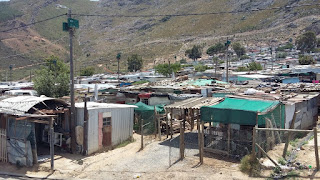A couple of years ago, however, when we were chatting to an American friend whom we'd first met here in Franschhoek two years before, she told us about a visit she'd just made to the local township. Like most visitors to this beautiful winelands valley, we had no idea it had a township. In Cape Town you pass a number on the way to and from the airport, or going through Hout Bay, but there was simply no sign of one in Franschhoek. As she spoke about what she'd seen and how she had helped to sponsor a soup kitchen there in the morning, we decided it was something we would like to do.
The plan had been to go with her and a local guide this year but for various reasons that didn't look as though it was going to happen, so instead we asked in the tourist office if there were any organised trips available. (Going independently to any township is very unwise.) A few phone calls later and we were signed up to go the next morning with a local company.
When we arrived at their office, it turned to be only the two of us plus Roger, a qualified tourist guide aged 35 who has lived in the township pretty much his whole life. He is ambitious, speaks at least four languages and, as he proudly explained, is the first person in his family ever to hold a driving licence - though he couldn't afford a car. He drove us there in the company's minibus and we were surprised to find not only that it was less then two miles outside the town, up on the hillside, but also that it had well maintained roads throughout the settlement - which was about the size of a small town. Given the state of the dwellings, many of which were basically decrepit shacks made out of sheets of rusting corrugated iron weighted down with rocks to stop them blowing away, we'd assumed there wouldn't be any proper roads. Roger explained that the area had originally been a fruit farm with a substantial house and labourers' cottages and outbuildings, so there had been a reasonable infrastructure already in place.
The township was created in about 1980, when apartheid was still firmly in place. In that area, as elsewhere, it was an offence for non-white people to walk in groups of three or more or to walk on the pavement, and failure to produce your passbook on request could result in a 6 month prison sentence. Freedoms which we take for granted simply didn't exist for the majority of the population.
Almost immediately a three tiered class system developed in the township, based mainly on income, and it is still fast entrenched. The poorest, including immigrants from Zimbabwe, live highest up the hill in extremely basic shacks, with no running water. They have to fetch their water from a communal tap by the side of the road. Electricity is now available to virtually everyone but on a pre-paid system, which not everyone can afford for more than an hour or two a day. The shacks in these photos will house entire families:
Roger showed us his previous home in this section, where he lived through most of his 20s. By scrimping and saving, he eventually managed to move into the area lower down the hill, buying the house you see here, with his fiancée in their kitchen:
I was surprised to see that the kitchen was well equipped, with a good quality cooker and microwave, and that there was a very large satellite TV in the living room. The rest of the furniture was minimal and scrappy, with no chairs apart from a battered old settee, and the rooms were tiny - mainly because Roger has rented out most of the building to a Somali family who run a shop from the front room.
As this post is rather long and the full version might exceed the limit, I've split it into two parts, and Part 2 will follow shortly.
As this post is rather long and the full version might exceed the limit, I've split it into two parts, and Part 2 will follow shortly.






No comments:
Post a Comment